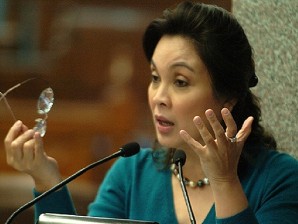
Senator Loren Legarda: Top choice. INQUIRER FILE PHOTO
MANILA, Philippines – Women are the unsung heroines in the battle against calamities and natural disasters brought about by climate change, Senator Loren Legarda said Thursday.
“The role of women in our society has continuously evolved through the years,” Legarda said in a statement. She recently spoke at the first anniversary of the women’s group “Nagkakaisang Kababaihan [United Women] ng General Trias” in the province of Cavite south of Metro Manila.
“For instance, in times of disaster and economic stress, women are the primary caregivers. They also carry out much of the household workload after a disaster,” Legarda said in her speech at the gathering.
She pointed out that females make up 52 percent of all the people in the world. Those being affected by disasters annually reach more than 100 million, she said.
Legarda, who heads the committee on Climate Change, said, “Women have been silently and effectively at the frontline of disaster prevention and climate change adaptation efforts.”
She enumerated several disaster risk reduction programs that are being implemented by women groups such as “women farmers in Montalban, Rizal who practice agroforestry to adapt to the prolonged wet season; a group of women fisherfolk in Hinatuan, Surigao del Sur who reforested over a hundred hectares of mangrove areas to protect their settlements from storm surges.”
Legarda also said that a women’s group in San Francisco (municipality) in Camotes Island, Cebu are “in charge of environmental protection and disaster prevention programs in each and every purok.”
“I am certain that the women of General Trias are also active participants in the local initiatives to protect the environment, such as the municipal-wide clean-up drive and the use of “eco-bags,” instead of plastic. These are important steps in making our communities safe against disaster risks,” Legarda said.
“Women around the world and here in the Philippines are silently making their invaluable contribution to society. It is time to usher a new phase where women and girls are no longer portrayed as victims but heroes,” she said.